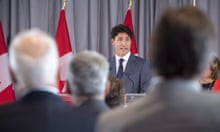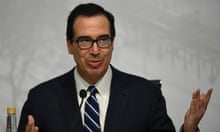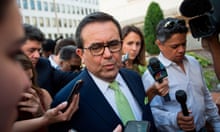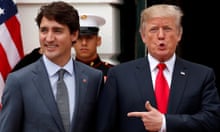Talks between Canada and the United States over renegotiating the Nafta trade agreement are going to the wire as Washington pushes for a deal by Friday.
“We’ve moved into a very intense rhythm of the negotiations, where our officials are working hard preparing issues for some high-level ministerial decisions,” Freeland told reporters on Thursday.
Freeland said she would meet Robert Lighthizer on Thursday evening – her fourth meeting with the US trade representative in recent days.
Canada’s top trade negotiator said she was “encouraged” by the urgent discussions aimed revamping the North American Free Trade Agreement, a tripartite deal between the US, Canada and Mexico.
“There’s a lot of goodwill. It’s a lot that we’re trying to do in a short period of time, we’re working very, very intensely,” she said. “We continue to be encouraged by the constructive atmosphere that I think both countries are bringing to the table.”
Sources told Reuters that trilateral talks were already under way at the technical level, while Ildefonso Guajardo, Mexico’s economy minister, was expected to rejoin talks as early as Thursday evening.
The talks – seen as a tense moment in a US-Canada relationship that has tumbled to its lowest point in recent memory – come some 18 months after Donald Trump hailed his northern neighbour and vowed that any Canada-related changes to Nafta would be minor.
The US president has seemingly altered his viewpoint in the months since, laid bare after the US and Mexico announced a bilateral deal on Monday. The news left Canada on the outside, forced to negotiate its way into the deal or face a breakdown in trade relations with their closest ally and biggest trading partner.
Freeland cut short a trip to Europe to rush to Washington DC, hoping to salvage Canada’s place in a trade pact that underpins the three-quarters of exports Canada sends south of the border and the 2.5m Canadian jobs that depend on US trade.
Trump’s Mexico announcement also came with a deadline of Friday, giving Canada just days to revamp a 24-year-old accord that accounts for more than $1tn in annual trade. The tight timeline is designed to push the deal through before Enrique Peña Nieto, Mexico’s president, leaves office at the end of November.
If Canada fails to keep its place in the free trade bloc, Trump has warned that he may attempt to push forward a bilateral US-Mexico deal, as well as imposing punitive tariffs on Canadian-made cars.
The situation leaves Canada with little room for leverage, caught between losing trade access to its biggest trading partner or risking tariffs and job losses in the Canadian auto industry.
The Canadians appear to be holding firm on a few key issues, probably bolstered by the many who argue that Trump does not have the authority from Congress to push forward with a bilateral deal.
Among the sticky points is the chapter 19 dispute-resolution mechanism, long described as a red line by Canadian officials as it hinders the US from pursuing dumping and anti-subsidy cases. US officials have said Mexico agreed to eliminate the mechanism.
“I think the Canadian view on Chapter 19 is well known,” Freeland told reporters on Wednesday. “This is a very intense moment in the negotiations. We’re trying to get a lot of things done really quickly. I think it will be most effective if we keep our negotiations on specific issues to the negotiating table.”
Other areas of dispute include a “sunset” provision that gives the deal a 16-year lifespan as well as Canada’s dairy sector, which has long provoked Trump’s fury over its price controls and protection from imports. Ottawa appears to be ready to make concessions in this sector, a position that could cost the government votes in next year’s federal election.
Canada’s dairy farmers – many of whom are concentrated in the vote-rich provinces of Ontario and Quebec – have long held tremendous sway over Canadian politics. The premier of Quebec, Philippe Couillard, warned this week that any weakening of Canada’s supply management policies would carry “serious political consequences”.
Still, both Trump and Canada’s prime minister, Justin Trudeau, have expressed optimism that a deal could be reached by the end of the week. “I think Canada very much wants to make a deal,” Trump said on Wednesday.
Trudeau echoed the sentiment, but added a caveat. “We recognise that there is a possibility of getting there by Friday, but it is only a possibility, because it will hinge on whether or not there is ultimately a good deal for Canada,” he told reporters in Ottawa. “No Nafta deal is better than a bad Nafta deal.”









